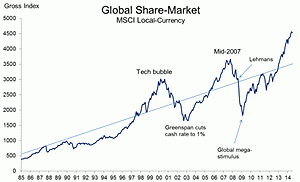
 New Zealand is in the midst of a protracted period of expansion.
New Zealand is in the midst of a protracted period of expansion.
The economy entered a relatively deep recession in 2008/09 but, with the exception of a late 2010 hiccup, has been growing consistently since Q4 2009.
Since the trough in activity, the New Zealand economy has grown 12.5% to be 9.1% bigger than at its previous peak in Q4 2007.
And while the peak in the cycle (in terms of rates of growth) is about now, we reckon there is at least another two years to run before the prospect of a negative quarterly outcome looms.
Alas, one of the ironies of growth cycles is that the peak in growth, when folk are making most money, is the very time when the expected returns for investing that money start to wilt. That’s because:
- Interest rates rise, slowing growth, raising corporates’ input costs, creating capital losses on fixed interest investments, and reducing the relative value in equitites;
- Housing markets are similarly impacted;
- Input costs, generally, are elevated as capacity constraints push up the cost of labour and other intermediate inputs at a time when sales growth is slowing – hence reducing corporate profitability.
We are now at that very stage of the economic cycle, but the possibility of a much stronger downtrend in asset prices, of all sorts, is this time greatly increased. This is not only because recent past returns have been exceptionally high but also due to the actions of global central banks in supplying copious stimulus to prop up ailing banking sectors around the world, post GFC.
Not only has this stimulus adopted the normal pattern of simply lowering interest rates to reduce the cost of capital but it has also broken new ground in creating negative interest rates (in Europe) and massive cash injections in the UK, USA and Japan. The implications of this have reverberated around the world creating substantial overvaluations in multiple asset prices.
By example:
- Bond yields are at extraordinarily low levels, despite the recent sell off. Yields must eventually go much higher potentially resulting in significant capital losses for those invested in bond funds.
- The major equity markets can be considered to be either at fair value or overvalued by most traditional metrics.
- Residential property prices are at elevated levels in many parts of the world – including New Zealand.
- Alternative asset markets, such as art, are being pushed to extremes. And,
- More generally, risk almost everywhere is being underpriced, thanks to extremely low volatility.
Having a closer look at each of these markets, in turn, is revealing.
Bond yields are reflective of both excess cash in the system and the underpricing of risk. In theory, a ten year bond yield, over time, should offer the same rate of return as that expected from investing in the productive economy such that folk are ambivalent between investing in financial and real assets.
Currently, the US ten year bond is yielding 2.49%, which is way below forecasters’ views of the nominal economy over the ten year period. If you believe that the Fed can keep inflation at around 2.0% and that the potential growth rate of the US economy is around 2.25% then nominal GDP growth will average around 4.25% over the next ten years. The eventual upside pressure on yields is clear.
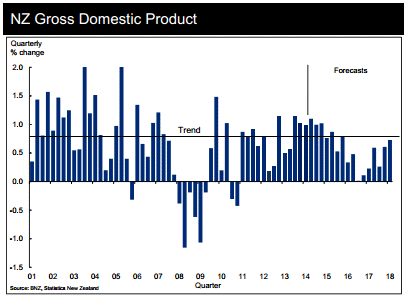
It would be fair to say that in reaching this conclusion the assumptions made about inflation and growth may be so the balance of risk must be that inflation and, plausibly, growth end up higher than anticipated. It is also worth noting that the market is not even pricing in the rate of increase in yields that a conservative Federal Reserve is postulating in its forecasts.
Bonds versus equities
Arguments about unrealistically low yields equally apply in the UK where the ten year bond is sitting at 2.55% and Australia at 3.54%. And don’t forget that the Japanese central bank is adamant that inflation will be pushed up to 2.0%.
Given their respective problems perhaps the argument is not so clear cut in the case of Germany (1.15%) and Japan (0.54%) but surely, even here some improvement in economic activity must eventually be in evidence.
And then there’s the risk argument. Do extremely low yields make sense in countries that are under continued levels of extreme distress?
- Spain at 2.58%?
- Portugal at 3.77%, despite the Government having to bail out Banco Espirtito Santo to the tune of EUR4.9bn?
- Brazil at 4.2% where there is not only emerging market risk but the prospect of much higher than 4.0% nominal GDP growth?
If bond yields back up, equities will come under pressure. Particularly if that back up in yields is accompanied by tightening monetary conditions more generally. At the same time that valuations come under threat from the interest rate side, it is also likely that earnings growth will be compromised as the pace of economic growth peaks and the easy gains from cost reductions (often in terms of reduced labour input) become history.
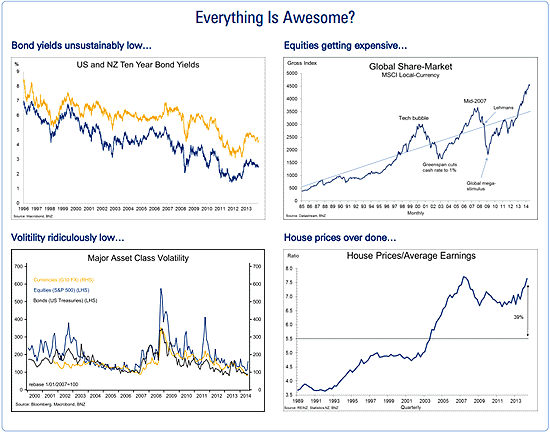
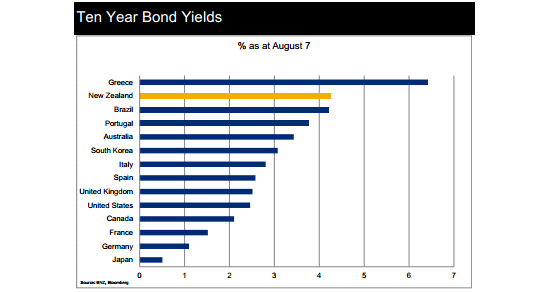
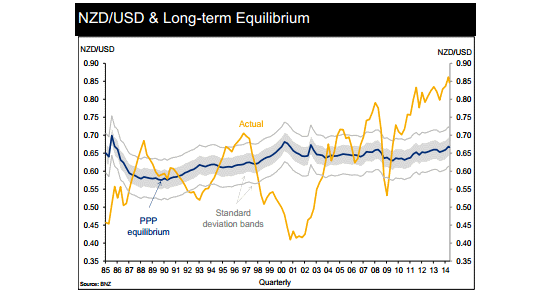
When one looks at forward P/E ratios for global markets, equities don’t look too bad. Certainly there is room for further short term upside as economic optimism continues to rise. However the combination of the aforementioned risks should be ignored at your peril and pessimists would point to the fact that trailing P/E ratios already show strong overvaluation. Moreover, analysis shows that almost 90% of the increase in the global MSCI index since early 2012 is a result of the rising forward P/E and only 10% due to rising expectations for profits. This is not a recipe for further price expansion. The recent correction in global equities may be the start of the chickens coming home to roost.
When financial assets look dodgy, residential property becomes a hot topic, but property prices in many parts of the world are already the beneficiaries of excess cash. New Zealand is no different in this regard with property further assisted by its preferential tax treatment and the fact that overseas buyers are increasingly interested in our market.
NZ property prices more than 30% over valued
It matters not whether you look at New Zealand property prices compared to rental returns or wages, they still look overdone to the tune of over 30%. Are they likely to correct any time soon? No, because excess demand still exists – and will probably continue to do so for some time yet. But supply is coming on stream and will do so at an ever-accelerating rate over the next few years. Eventually, excess demand will be whittled away and that’s when the correction will come. New Zealand property is now far from a one-way bet.
Alternative asset markets are going crazy. Art auctions in London and New York are reaching ever higher prices. Surely, this also reflects spare cash looking for a home.
Behind much of the asset appreciation that is going on is the fact that risk is being inappropriately priced. The margins between risky assets and “low-risk” assets are on the decline as volatility in global markets reduces. An obvious beneficiary of that, close-to-home, is the ongoing strength in the New Zealand dollar. Measures of volatility are at record lows so one can only assume that such volatility will increase at some stage. When this happens the re-rating of risky assets could be extreme.
All of this is not to say that there is no money to be made:
- Even if all asset prices were in decline, money can be made from trading spreads as there will always be some assets that perform better than others;
- Trading volatility itself may be an option;
- There will always be outperformers in every sector – there will always be an underpriced house somewhere or a new business listing that fires;
- There will always be money to be made in currencies as every currency is a pair so that one leg is going up and one leg is going down.
On the currency front, we do hold some very strong views that the New Zealand dollar is overvalued and that the recent correction we have witnessed is just the beginning. When the US eventually moves to raise rates this is likely to support the USD against most other currencies. The same can be said of the GBP. Eventually the Yen and EUR will be supported by tighter policy but in the interim further easing seems more likely.
Of course, overlaying all this from a New Zealand perspective is the stance of monetary policy here, our relative growth profile and the passage of commodity prices. Collectively these factors have been highly supportive of the NZD but the worm is most definitely starting to turn.
That said, currency speculation is not for the faint hearted. Risks are many and even if you decide to take a currency punt, finding the assets to do this with can be very problematic.
Leaving aside high-risk currency speculation, we are thus entering a period of time when it looks like it will become more and more difficult to make money. Those with a nest egg will probably have to be willing to accept lower returns on their assets. This will pose some very difficult questions for those in the funds management industry:
- Folk are far less likely to question fees when returns are solid but the lower are the returns the bigger proportion of that return fees will account for.
- Banks will again become greater competition for funds flows. Why would an individual put money in a managed fund when you can get an effective return in excess of 6.0% by putting your money in a five year PIE – an investment that, rightly or wrongly, is seen by many as being extremely low risk?
- The ever-growing proportion of the populace that is part of the Kiwisaver scheme is used to seeing their savings increase in value. How will they feel if this no longer remains the case?
People have to save somewhere. Investing always comes with risk.
But given the combination of structural and cyclical factors that are about to collide, we reckon the next few years may well test the patience of the funds management industry and investors alike, to the limit.
This is not to say that the world ahead looks disastrous. Quite the opposite, the immediate future looks a lot more promising from a real world perspective.
It’s just that that the ability for investors to capitalize on this is very constrained by the starting point that grates them.
----------------------------------------------------
Stephen Toplis is Head of Research at BNZ. This article was first published in the BNZ Economy Watch.
9 Comments
Timing is the thing for such a strategy. Not so sure leaving money aboad medium and longer term, today, yes probably, Given the exchange rate.
I mean the UK is a basket case longer term, its debt looks overwelming and the EU is an utter mess and even worse. The US looks somewhat better in comparison if only because ppl trust it (hahahaha). When the big event occurs I expect the exchange rate will collapse 85cents to 50cents USA (maybe even worse) as the cheap moeny runs for home. Then moving money home would be a massive win on the exchange rate.
Of course its all 1s and 0s that can disappear really fast, so once back here and given our Govn's tax income will collapse in such an event its where to put it to not lose it.
Kind of thinking buying precious metals should be on the table at the right point in time.
Being a debtor (mortgage) in my case its moot of course, so fix the same point as buying precious metals.
Personally I think its extremely complex and how humans will react the biggest unknown.
regards
Global crash coming , says Rajan. http://www.nzherald.co.nz/business/news/article.cfm?c_id=3&objectid=11306873
So he joins the peak oilers, and then the financial/economists like Steve keen.
He's right IMHO and not only has the financial mess not been fixed its been allowed to get way worse.
"an explosion in financial innovation had made the world riskier, rather than safer."
LOL, really? no sh*** sherlock...
Meantime diddly to address energy issues.
Financial "innovation" produces little or no good these days, in fact Im convinced its NET parasitic, hurting 90% of the world's population.
I cant see how this game of confidence failure will be a small event.
Some other interesting comments,
""Of course there is the age-old mantra 'let the exchange rate do the talking and then you are insulated', [but] that advice is garbage" he said."
I agree.
regards

We welcome your comments below. If you are not already registered, please register to comment.
Remember we welcome robust, respectful and insightful debate. We don't welcome abusive or defamatory comments and will de-register those repeatedly making such comments. Our current comment policy is here.